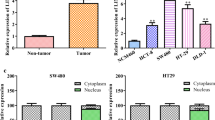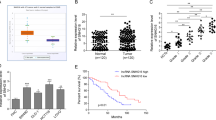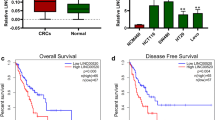Abstract
Growing evidence has suggested that lncRNAs play a significant role in the development of colorectal adenocarcinoma. LncRNA LINC02535 was a potential novel lncRNA marker of neoplastic processes of the colon. Nevertheless, the function and mechanisms of LINC02535 in colorectal adenocarcinoma remain unclear. Proteins levels were measured by western blotting. EdU, CCK-8, Transwell, and wound healing assays were performed to investigate the function of LINC02535 in colorectal adenocarcinoma. The distribution of LINC02535 in cells was evaluated by subcellular fractionation assay. The interaction among RNAs was identified by luciferase reporter and RIP assays. In this study, our findings revealed that LINC02535 was highly expressed in colorectal adenocarcinoma cells. Knockdown of LINC02535 inhibited colorectal adenocarcinoma cell proliferation, migration, and invasion. Mechanistically, LINC02535 bound with miR-30d-5p and worked as a competing endogenous RNA to facilitate the expression of messenger RNA chromodomain helicase DNA-binding protein 1 (CHD1). miR-30d-5p directly targeted the sequence of CHD1 3′-untranslated region. Notably, CHD1 upregulation abolished the suppressive influence of LINC02535 inhibition on the malignant phenotypes of colorectal adenocarcinoma cells. Overall, it was disclosed that LINC02535 played an oncogenic role in colorectal adenocarcinoma progression by sponging miR-30d-5p to upregulate CHD1 expression.






Similar content being viewed by others
Data Availability
The datasets used during the current study are available from the corresponding author on reasonable request.
References
Ji, L., Chen, S., Gu, L., & Zhang, X. (2020). Exploration of potential roles of m6A regulators in colorectal cancer prognosis. Frontiers in Oncology, 10, 768.
Liu, J., Li, C., Xu, J., & Wu, H. (2018). A patient-oriented clinical decision support system for CRC risk assessment and preventative care. BMC Medical Informatics and Decision Making, 18(Suppl 5), 118.
Ballester, V., Rashtak, S., & Boardman, L. (2016). Clinical and molecular features of young-onset colorectal cancer. World Journal of Gastroenterology, 22(5), 1736–1744.
Liu, L., Xie, D., Xie, H., Huang, W., Zhang, J., Jin, W., Jiang, W., & Xie, D. (2019). ARHGAP10 inhibits the proliferation and metastasis of CRC cells via blocking the activity of RhoA/AKT signaling pathway. OncoTargets and Therapy, 12, 11507–11516.
Siegel, R. L., Miller, K. D., Fedewa, S. A., Ahnen, D. J., Meester, R. G. S., Barzi, A., & Jemal, A. (2017). Colorectal cancer statistics, 2017. CA: Cancer Journal for Clinicians, 67(3), 177–93.
Delgado, M. D., & León, J. (2006). Gene expression regulation and cancer. Clinical & Translational Oncology: Official Publication of the Federation of Spanish Oncology Societies and of the National Cancer Institute of Mexico, 8(11), 780–787.
Slack, F. J., & Chinnaiyan, A. M. (2019). The role of non-coding RNAs in oncology. Cell, 179(5), 1033–1055.
Zhang, P., Wu, W., Chen, Q., & Chen, M. (2019). Non-coding RNAs and their integrated networks. Journal of Integrative Bioinformatics. https://doi.org/10.1515/jib-2019-0027
Yan, X., Hu, Z., Feng, Y., Hu, X., Yuan, J., Zhao, S. D., Zhang, Y., Yang, L., Shan, W., He, Q., & Fan, L. (2015). Comprehensive genomic characterization of long non-coding RNAs across human cancers. Cancer Cell, 28(4), 529–40.
Wu, W., Ji, X., & Zhao, Y. (2019). Emerging roles of long non-coding RNAs in chronic neuropathic pain. Frontiers in Neuroscience, 13, 1097.
Yingmin, W., Yang, X., Chen, Z., Tian, L., Jiang, G., Chen, F., Li, J., An, P., Linlin, L., Luo, N., Jun, D., Shan, H., Liu, H., & Wang, H. (2019). m(6)A-induced lncRNA RP11 triggers the dissemination of colorectal cancer cells via upregulation of Zeb1. Molecular Cancer, 18(1), 87.
Liang, Z. X., Liu, H. S., Wang, F. W., Xiong, L., Zhou, C., Hu, T., et al. (2019). LncRNA RPPH1 promotes colorectal cancer metastasis by interacting with TUBB3 and by promoting exosomes-mediated macrophage M2 polarization. Cell Death & Disease, 10(11), 829.
Wang, Y., Jia-Huan, L., Qi-Nian, W., Jin, Yg., Wang, D. S., Chen, Y. X., Liu, J., Luo, X. J., Meng, Q., Heng-Ying, P., Wang, Y. N., Pei-Shan, H., Liu, Z. X., Zeng, Z. L., Zhao, Q., Deng, R., Zhu, X. F., Huai-Qiang, J., & Rui-Hua, X. (2019). LncRNA LINRIS stabilizes IGF2BP2 and promotes the aerobic glycolysis in colorectal cancer. Molecular Cancer, 18(1), 174.
Wu, J., Gao, L., Chen, H., Zhou, X., Lu, X., & Mao, Z. (2021). LINC02535 promotes cell growth in poorly differentiated gastric cancer. Journal of Clinical Laboratory Analysis. https://doi.org/10.1002/jcla.23877
Wen, D., Huang, Z., Li, Z., Tang, X., Wen, X., Liu, J., & Li, M. (2020). LINC02535 co-functions with PCBP2 to regulate DNA damage repair in cervical cancer by stabilizing RRM1 mRNA. Journal of Cellular Physiology, 235(10), 7592–7603.
Kalmár, A., Nagy, Z. B., Galamb, O., Csabai, I., Bodor, A., Wichmann, B., Valcz, G., Barták, B. K., Tulassay, Z., Igaz, P., & Molnár, B. (2019). Genome-wide expression profiling in colorectal cancer focusing on lncRNAs in the adenoma-carcinoma transition. BMC Cancer, 19(1), 1059.
Qi, X., Zhang, D. H., Wu, N., Xiao, J. H., Wang, X., & Ma, W. (2015). ceRNA in cancer: Possible functions and clinical implications. Journal of Medical Genetics, 52(10), 710–718.
Zhang, L., Li, C., & Su, X. (2020). Emerging impact of the long noncoding RNA MIR22HG on proliferation and apoptosis in multiple human cancers. Journal of Experimental & Clinical Cancer Research: CR, 39(1), 271.
Martínez-Barriocanal, Á., Arango, D., & Dopeso, H. (2020). PVT1 long non-coding RNA in gastrointestinal cancer. Frontiers in Oncology, 10, 38.
Schoberleitner, I., Mertens, B., Bauer, I., & Lusser, A. (2022). Regulation of sensory perception and motor abilities by brain-specific action of chromatin remodeling factor CHD1. Frontiers in Molecular Neuroscience, 15, 840966.
DeDecker, L., Coppedge, B., Avelar-Barragan, J., Karnes, W., & Whiteson, K. (2021). Microbiome distinctions between the CRC carcinogenic pathways. Gut Microbes, 13(1), 1854641.
Wang, Y., Hou, J., He, D., Sun, M., Zhang, P., Yu, Y., & Chen, Y. (2016). The emerging function and mechanism of ceRNAs in cancer. Trends in Genetics: TIG, 32(4), 211–224.
Zhang, H., & Lu, B. (2020). The roles of ceRNAs-mediated autophagy in cancer chemoresistance and metastasis. Cancers, 12(10), 2926.
Sun, Q., Li, J., Li, F., Li, H., Bei, S., Zhang, X., & Feng, L. (2019). LncRNA LOXL1-AS1 facilitates the tumorigenesis and stemness of gastric carcinoma via regulation of miR-708-5p/USF1 pathway. Cell Proliferation, 52(6), e12687.
Zhao, L., Hu, K., Cao, J., Wang, P., Li, J., Zeng, K., He, X., Tu, P. F., Tong, T., & Han, L. (2019). lncRNA miat functions as a ceRNA to upregulate sirt1 by sponging miR-22-3p in HCC cellular senescence. Aging, 11(17), 7098–122.
Correia de Sousa, M., Gjorgjieva, M., Dolicka, D., Sobolewski, C., & Foti, M. (2019). Deciphering miRNAs’ action through miRNA Editing. International Journal of Molecular Sciences, 20(24), 6249.
Liang, L., Yang, Z., Deng, Q., Jiang, Y., Cheng, Y., Sun, Y., & Lei, L. (2021). miR-30d-5p suppresses proliferation and autophagy by targeting ATG5 in renal cell carcinoma. FEBS Open Bio, 11(2), 529–540.
Qi, Y., Hou, Y., & Qi, L. (2021). miR-30d-5p represses the proliferation, migration, and invasion of lung squamous cell carcinoma via targeting DBF4. Journal of Environmental Science and Health Part C, Toxicology and Carcinogenesis. https://doi.org/10.1080/26896583.2021.1926855
He, W. P., Guo, Y. Y., Yang, G. P., Lai, H. L., Sun, T. T., Zhang, Z. W., Ouyang, L. L., Zheng, Y., Tian, L. M., Li, X. H., & You, Z. S. (2020). CHD1L promotes EOC cell invasiveness and metastasis via the regulation of METAP2. International Journal of Medical Sciences, 17(15), 2387–95.
Li, S., Chai, Y., Ding, Y., Yuan, T., Wu, C., & Huang, C. (2019). CHD1L is associated with poor survival and promotes the proliferation and metastasis of intrahepatic cholangiocarcinoma. Oncology Reports, 42(2), 657–669.
Wang, W., Wu, J., Fei, X., Chen, W., Li, Y., Shen, K., & Zhu, L. (2019). CHD1L promotes cell cycle progression and cell motility by up-regulating MDM2 in breast cancer. American Journal of Translational Research, 11(3), 1581–1592.
Acknowledgements
Not applicable.
Funding
No funding was received.
Author information
Authors and Affiliations
Corresponding authors
Ethics declarations
Conflict of interest
The authors have no conflict of interest to declare.
Additional information
Publisher's Note
Springer Nature remains neutral with regard to jurisdictional claims in published maps and institutional affiliations.
Supplementary Information
Below is the link to the electronic supplementary material.
12033_2022_628_MOESM1_ESM.tif
Supplementary file1 (TIF 175 KB) Effect of LINC02535 on NCM460 cell proliferation. A. qRT-PCR analysis for assessing transfection efficiency of LINC02535 knockdown in NMC460 cells. B. CCK-8 assay for assessing the viability of NCM460 cells. C-D. EdU assay for evaluating proliferation of NCM460 cells
12033_2022_628_MOESM2_ESM.tif
Supplementary file2 (TIF 179 KB) Effect of CHD1 on NCM460 cell proliferation. A. qRT-PCR analysis for assessing transfection efficiency of CHD1 overexpression in NMC460 cells. B. CCK-8 assay for examining the viability of NCM460 cells. C-D. EdU assay for evaluating proliferation of NCM460 cells
Rights and permissions
Springer Nature or its licensor (e.g. a society or other partner) holds exclusive rights to this article under a publishing agreement with the author(s) or other rightsholder(s); author self-archiving of the accepted manuscript version of this article is solely governed by the terms of such publishing agreement and applicable law.
About this article
Cite this article
Li, J., Xu, J., Zheng, S. et al. LncRNA LINC02535 Induces Colorectal Adenocarcinoma Progression via Modulating miR-30d-5p/CHD1. Mol Biotechnol 65, 1346–1358 (2023). https://doi.org/10.1007/s12033-022-00628-4
Received:
Accepted:
Published:
Issue Date:
DOI: https://doi.org/10.1007/s12033-022-00628-4




